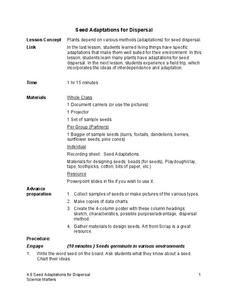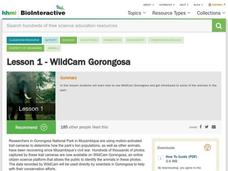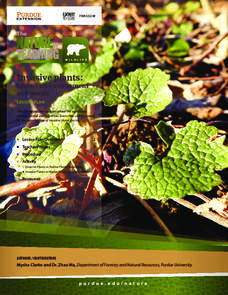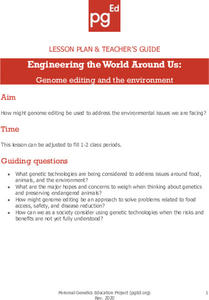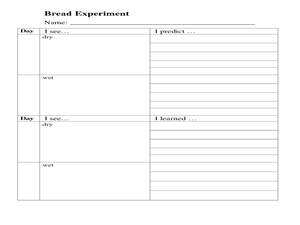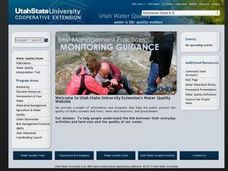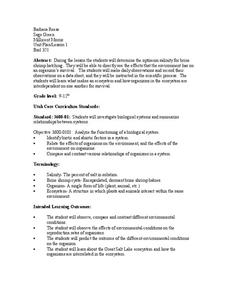KOG Ranger Program
How Much do I know?
Camping trips can be so fun with the right safety knowledge. Learners take a short survey of statements about fire safety and erosion in the forest, answering true or false to each one based on their prior knowledge
KOG Ranger Program
Leading Causes of Wildfires in Oregon
You've heard of "wildfire season," but what types of weather and conditions lead to increased wildfires? Young firefighters learn about common sources of wildfires, safe ways to clear debris near their homes, and the most effective ways...
KOG Ranger Program
Managing Forests to Prevent Wildfires
Sometimes the best way to prevent forest fires is to create smaller fires. Explore forest management with an activity that explains the ways that controlled burns can keep unexpected fires from running amok in the wilderness and nearby...
Nature Works Everywhere
Fishing for a Future
Teaching a man to fish has an environmental impact. Through a series of four lessons, learners study the science of fishery management. Their study involves analyzing data to develop a management strategy for specific fish and common...
Nature Works Everywhere
Sharks and Shorelines
Examine predator-prey marine relationships through an interactive lesson design. Learners begin by studying a specific shark species and then analyze real-time shark-tracking data. They also study threats to shark populations and...
Science Matters
Blubber Gloves: It’s All About Insulation
Instill the concept of adaptation with the help of Blubber Gloves—ziplock bags, shortening, and duct tape. Scholars discuss how animals and plants keep warm in polar regions, record their predictions, and try on their Blubber Gloves to...
Science Matters
Seed Adaptations for Dispersal
After a grand conversation about seeds, adaptation, and dispersal, scholars work collaboratively to examine seeds and record their findings on a four-column chart. Small groups share their observations and further discuss seed...
Science Matters
Lotusland
It's time for a field trip! Scholars take their new-found knowledge of adaptations and seed dispersal on a field trip to a local botanical garden. They gain an up-close look at how ecological interdependence works in a distinct...
Science Matters
Matter Cycles — Sum It Up
Scholars become part of the cycle of matter with a reader's theater that showcases producers, consumers, decomposers, and the sun. A diagram and discussion concludes the learning experience and enhances comprehension.
Science Matters
Crawly Composters
Get your hands dirty with an interactive lesson that showcases the process of decomposing and returning nutrients back into the soil. After building a compost pile, pupils regularly observe the ways worms help with changes to the soil...
Science Matters
Energy Flow
Budding scientists work collaboratively to reenact energy flow in a food chain. Scholars take on roles such as producer and consumer and perform tasks that symbolize energy flow in order to provide evidence of how much energy passes...
Howard Hughes Medical Institute
Lesson 1: WildCam Gorongosa
Take a walk on the wild side! Episode one of an eight-part series of interactive lessons regarding Gorongosa National Park invites learners to become a part of the citizen science community. Scholars read a brief overview of the trail...
National Park Service
Weather Patterns of the Pacific Ocean
How do oceans affect weather patterns? Learners define vocabulary associated with dew point, topographical lifting, condensation, and formation of clouds and precipitation as they explore the weather in the Pacific Northwest. They also...
Purdue University
Invasive Plants: Impact on Environment and People
It's the attack of the invasive species! Young scientists simulate the behavior of an invasive species with a game-like activity. They assume the roles of native plants, invasive plants, and resources and watch the invasive plant takes...
Alabama Wildlife Federation
Forest Floor Investigation
Most living things go unnoticed. Change that using a fun activity about the nutrient cycle. Pupils use hula hoops to mark areas of study and then make observations about the living things they see. They first make surface observations,...
Chicago Botanic Garden
Seasons of a Plant
Reading the cues from nature can be as much an art as a science. The second installment in a six-part unit on climate teaches learners that environmental and biological events have significance. They first learn the difference between...
University of Florida
Six Bits of Abiotics
Collect clues and unwrap a mystery in an intriguing study about air pollution and urban forests. Teams share information to explore abiotic interactions and forest health. Scholars create a concept map using newly acquired knowledge and...
Bonneville
The Problem of Plastic Trash Islands
Trash collection can be a hassle, especially out in the ocean. The second of four parts in the Adrift in a Sea of Plastic unit has pupils research plastic trash islands in marine ecosystems. They investigate why they occur and potential...
Personal Genetics Education Project
Engineering the World Around Us: Genome Editing and the Environment
Challenge young minds to build a better world with genetic engineering. Biologists learn potential solutions for environmental issues using genome editing while interacting with three case studies. Scholars read articles and view...
Curated OER
Effects of Water Pollution on Aquatic Organisms
Students investigate water pollution. They develop an understanding of the behavior of organisms, of the structure and properties of matter, and of natural and human induced hazards by conducting lab tests. They present their data...
Curated OER
Forest Decomposition
Learners explore decomposition. Students define and describe components of the decomposition process. Learners make a composter in a terrarium. Students record observations and changes weekly, drawing conclusions about the results of...
Curated OER
Environmental Risk Management
Students investigate the concepts related to managing the environment. They conduct research using a variety of resources. Students cite examples of different organisms that have been targeted to become endangered. They answer questions...
Curated OER
That Is Predictable
Students investigate the changes that can take place in an aquatic environment. They conduct research using a variety of resources. The research is used to report different possibilities of change because of abiotic or biotic factors.
Curated OER
Hatching Brine Shrimp
Third graders investigate the environment that is considered favorable for brine shrimp hatching. The salinity level is of particular interest in the observations because the optimum level is needed for survival. They make daily...
Other popular searches
- Ecosystems and Biomes
- Ecosystems Activities
- Aquatic Ecosystems
- Freshwater Ecosystems
- Ecosystems in a Jar
- Ocean Ecosystems
- Biodiversity and Ecosystems
- Ecosystems and Art
- Underwater Ecosystems
- Populations and Ecosystems
- Urban Ecosystems
- Energy Flow in Ecosystems








